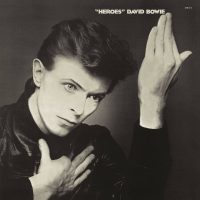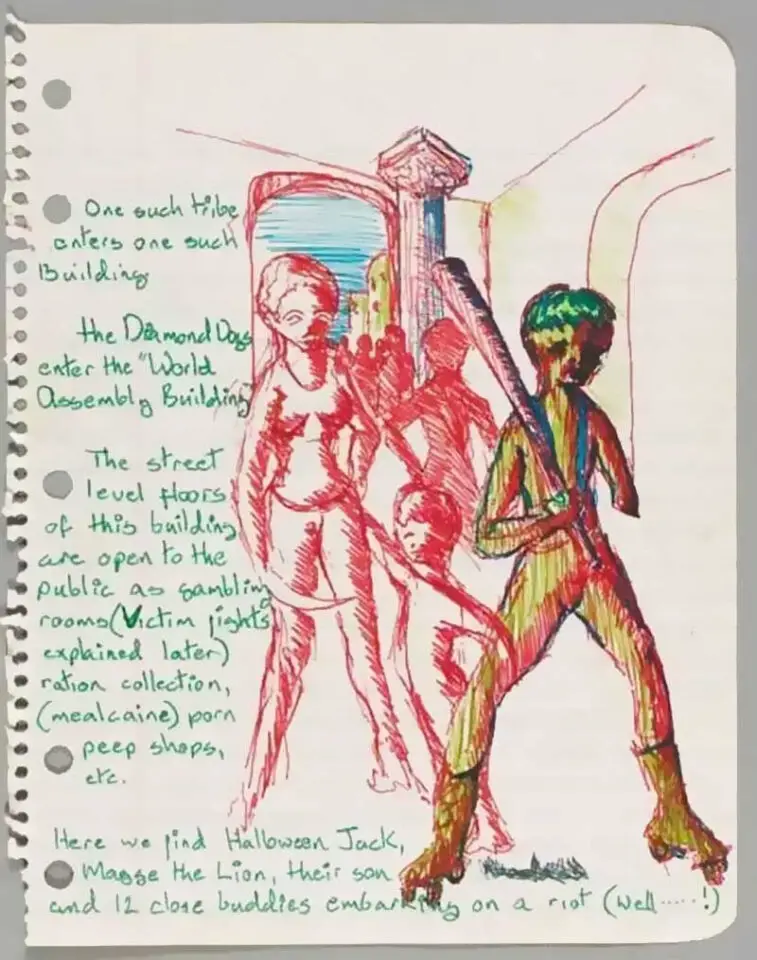 Written by: David Bowie
Written by: David Bowie
Recorded: July-August 1977
Producers: David Bowie, Tony Visconti
Released: 14 October 1977
Available on:
“Heroes”
Ouvrez Le Chien (Live Dallas 95)
Contents
Personnel
David Bowie: vocals, piano
Robert Fripp, Carlos Alomar: guitar
Brian Eno: EMS VCS 3 synthesizer, guitar treatments
George Murray: bass guitar
Dennis Davis: drums
Tony Visconti: backing vocals
‘Joe The Lion’ is the second song on David Bowie’s “Heroes” album. It was partly inspired by American performance artist Chris Burden.
I had no melody, so I only sang the lines I’d written for four or five bars at a time. Having sung one line, I’d take a breath and do the same thing again, and so on to the end. I never knew the complete melody until I’d finished the song and played the whole thing back.
The Observer, 20 November 1977
Burden became known in the early 1970s for his performance artworks. His most notorious work was ‘Shoot’ (1971), in which a friend shot him in the left shoulder with a .22 rifle, in front of a small audience at the F-Space gallery in Santa Ana, California. The event was captured in an eight-second film, and Burden later presented the work using photographs and text.
Another piece, ‘Trans-Fixed’, was staged on 23 April 1974 at Speedway Avenue in Venice, California. Burden laid on his back on the rear of a Volkswagen Beetle and was crucified: his attorney hammered nails through his open palms into the car’s roof, while assistants ran the engine, opened the garage door, and rolled the vehicle outside where it ran stationary for two minutes at full throttle before being pushed back into the garage.
Both pieces were referenced by Bowie in ‘Joe The Lion’ – ‘Trans-Fixed’ in “Nail me to my car and I’ll tell you who you are”, and ‘Shoot’ in the lines “Guess you’ll buy a gun/You’ll buy it second hand”.
“Heroes” was the only album of David Bowie’s so-called ‘Berlin trilogy’ to be completely recorded in the city, and its culture and characters made their way into several songs.
The content of the album, which was the looking at the street life in Berlin, had a lot to do with the feeling of ‘Joe The Lion’ and “Heroes”. It’s like the street life in New York but without the emphasis on consumerism. Politically, it’s a lot more radical in its expression; everybody has a very definite political view, either far right or far lest. That kind of friction produces a wonderful… they say zeitgeist. There is a zeitgeist of the future, there is a feeling of social responsibility that’s overpowering. There’s not the kind of lush, decadent thing that’s thrown about concerning Berlin – that’s entirely wrong. There’s a young population there and the middle-aged and the family people have moved out into West Germany because there’s no industry left.So the people who are in Berlin are older stoics who have no intention of ever moving; or students, because there’s still a great emphasis on education in Berlin. Because of that there’s a serious quality to the people, a resistance to silliness. They want change to come about positively for the people.
Musician magazine, May 1983
Magge the Lion was the name of one of the characters in Bowie’s planned Diamond Dogs film in 1975. Concept art shown at the David Bowie Is exhibition was accompanied by Bowie’s handwritten notes and ideas:
The Diamond Dogs enter the “World Assembly Building”.The street level floors of this building are open to the public as gambling rooms (Victim fights explained later) ration collection, (mealcaine) porn peep shops, etc.
Here we find Halloween Jack, Magge the Lion, their son and 12 close buddies embarking on a riot (well…!)
Joe was also Bowie’s son’s preferred name as a teenager. Duncan Zowie Haywood Jones was born on 30 May 1971; initially known as Zowie, in the early 1980s he became known as Joe, before reverting to his birth name in adulthood.
Zowie stayed with his father [after the divorce], the court ordering that he be available to me twice a year. After living in Berlin he went to school in Lausanne, then attended Gordonstoun, the ultra-exclusive boarding school of the British elite in Scotland. Around that time he decided he would be called Joe (wouldn’t you?), and a few years later he decided he didn’t want to see me or talk to me. Now twenty-one, he’s a man I don’t know.
Backstage Passes: Life on the Wild Side with David Bowie

